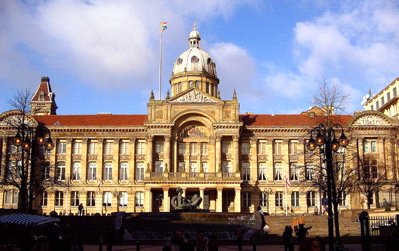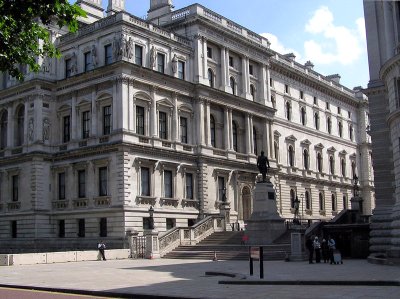A history of Britain's Victorian industrial cities offers compelling lessons for Hamilton.
By Nicholas Kevlahan
Published March 19, 2007
Hamilton is Canada's best example of a Victorian industrial city. Despite widespread 20th century demolition, Victorian residential, commercial and manufacturing buildings still define its urban fabric. Even Hamilton's slogan, "the ambitious city", reflects the optimism and energy of the Victorians.
The Victorian industrial city conjures up images of dark satanic mills, oppressive working conditions, and dangerous levels of pollution. This image is certainly true of the early part of the century, but we remember these images because they were part of a (largely successful) campaign of social reform waged by enlightened factory owners, labour leaders, novelists and municipal politicians.
In fact, the Victorians have left us a legacy of effective social legislation, improved public health and strong community organizations. The YMCA, YWCA, SPCA, Children's Aid Society, trade unions, public health departments, and legislated standards for food and housing are all Victorian legacies.

Industrial cities were at the peak of their power and influence in the late 19th century. Tristram Hunt's book Building Jerusalem: the rise and fall of the Victorian City (Metropolitan Books: 2005) is an excellent history of the 19th century industrial city in Britain (particularly Manchester, Birmingham, Liverpool, Leeds and Glasgow). As the "Birmingham of Canada" we share much of this history (and subsequent decline).
Hunt is an historian who specializes in Victorian urban history. He is also a columnist for the Guardian and Observer newspapers, and produced a well-regarded television programme on the English Civil war for the BBC.
Building Jerusalem is a popular re-working of his 2000 PhD thesis "Civic thought in Britain: c1820 - c1860", and makes good use of primary sources. Despite its academic origins, the book is jargon-free and interesting for the non-specialist.
This is an ambitious book. Hunt covers the evolution of Victorian civic thought as reflected in politics, literature and architecture. Although it is a work of history, Building Jerusalem is also political. Hunt argues for more powerful and creative city government, and a proper appreciation of urban life.
Hunt also shows that cities need not be passive in the face of current social and economic challenges. These themes will be familiar to readers of RTH!

Figure 1: Joseph Chamberlain (1836-1914). Mayor of Birmingham and pioneer of "gas and water socialism." (Image Source: Wikipedia)
One of the most interesting chapters describes the development of Birmingham under its ambitious mayor Joseph Chamberlain (father of the infamous British Prime Minister Neville Chamberlain).
Chamberlain moved from London to Birmingham in 1854 during the economic boom of the 1850s and 1860s. He set up a screw manufacturing company and made a fortune during the Franco-Prussian war by cornering the French screw market while Paris was under siege.
By the 1870s his firm employed 2 500 workers and controlled 70% of Birmingham's screw output. However, Chamberlain was not just a skilful entrepreneur.
His Unitarian upbringing made him a strong believer in self-improvement for his workforce, and he instituted reading evenings, a French class, a Debating Club, a Benefit Club and a Working Men's institute.
Despite its economic success, Birmingham was in a terrible state. City hall was dominated by a conservative group of small shopkeepers called the 'Economists'. The Economists believed that the municipality should "ensure a light policing of the streets, a respect for contracts and that was about it."
One of their most bizarre acts was to petition the government to revoke the city's Charter of Incorporation (passed four years earlier) in order to reduce taxes!
Civic infrastructure was close to collapse and, in an attitude reminiscent of Hamilton's area weighting for property taxes, the conservative councillors opposed any sanitary or civic improvements that might increase taxes.
This situation was clearly intolerable. However, change came not from city hall but from the pulpit of Baptist preacher George Dawson. Dawson's sermons were focused on building a community from what the Economists treated as a loose collection of individuals brought temporarily together by economic forces.
Dawson's political activity eventually caused him to be kicked out of Mount Zion Chapel, but he founded his own "Church of the Saviour" and his popularity increased. Dawson was convinced that dirty industrial Birmingham could be transformed into a new "Jerusalem."
Chamberlain was inspired to take on the Economists and run for councillor by Dawson's arguments about a Christian's duty to community. He was a natural politician and eventually became mayor, swept to power on a strong reformist and community-building platform.
The Economists (somewhat hypocritically) scorned elected officials. Chamberlain set out to prove them wrong, and embarked on an ambitious programme to improve the social conditions and built environment of his adopted city.
His accomplishments were substantial. He started by buying up the gas companies in 1875 (paying almost two million pounds!), and then using the profits (£80 000 per year by 1879) to reduce taxes, create a reserve fund and pay down the city's debt.
He then took over the water works in order to improve public health. Although these "municipalizations" might look like socialism, they were largely motivated by the need for business to have secure energy supplies (something Richard Gilbert's recent report [PDF link] has said Hamilton should also worry about!).
In fact, Birmingham was seen as the quintessential businessman's city. Chamberlain liked to say: "The 11th Commandment is that thou shalt keep a balance-sheet."

Figure 2: Birmingham's Council House (1879). A gothic design was also considered. (Image Source: Wikipedia)
Chamberlain went on to improve housing, streets and parks. Mortality rates declined sharply, business boomed and the city was making a profit. However, Dawson's sermons also emphasized the importance of the spiritual and cultural life of a city, and Chamberlain was not about to neglect them.
Soon Birmingham had a "City Museum and Art Gallery" in a magnificent new building, public schools, a Council House and a new Town Hall.
When Hamilton called itself "the ambitious city", it was explicitly emulating this sort of energy and creativity. Chamberlain eventually stepped down as mayor and went on to a successful career in national politics (something rare in Canada).
Urban politics was not the only fight the Victorians pursued. As described in an excellent RTH article, architecture was also a battleground and the victors have left their gothic and Italianate traces on Hamilton.
Hunt spends an enjoyable couple of chapters chronicling these style wars that pitted the republican renaissance style (favoured by the new industrial cities and the banks) against the gothic style (favoured by the Church of England and other conservatives).
The British Houses of Parliament (designed by the architect Sir Charles Barry who trained Frederick Rastrick, the architect of Victorian Hamilton) were built in the gothic style. The Foreign Office, on the other hand, was built in the Italian renaissance style after an emotional debate and parliamentary vote.
It is hard to imagine the architectural style of a building generating this sort of public interest today. The Victorians clearly saw buildings as symbols, and were building substantially and for future generations.

Figure 4: Britain's Foreign Office, built in Victorian Italianate style. (Image Source: Wikipedia)
The final part of Building Jerusalem charts the slow decline of Britain's industrial cities throughout the 20th century. Hamilton had the same origins as its British cousins, and has followed a similar trajectory. Hunt presents a detailed diagnosis of the problems afflicting these once-mighty cities.
Some problems were international (the decline of manufacturing), some were political (the national government drained power and autonomy away from municipalities), and some were due to social changes (the rise of the suburbs and an associated devaluing of urban living).
However, a large part of the blame lies with the municipal governments themselves for failing to deal effectively with these challenges. City Hall had lost its nerve.
Some of Britain's industrial cities are slowly turning themselves around. Leeds has become a financial centre (see Ben Bull's articles for more on this), Manchester has renovated its industrial centre, and Glasgow is turning around its crime-ridden image.
These changes have been backed by large amounts of national and European Union funding (something desperately lacking in Canada). However, Hunt believes that there "is a depressing absence of modern Chamberlains stepping forward for office." Without effective and ambitious leadership these cities (and Hamilton) will not have a bright future.
I highly recommend Building Jerusalem to RTH readers. We can learn much from the history of Britain's industrial cities, both positive and negative. However, the most important lesson we can learn from these eminent Victorians is confidence.
Hamilton need not be a passive victim of external economic forces. If we have sufficient imagination and effective leadership we can shape our own future, for the benefit of the whole community.
By whynot? (anonymous) | Posted March 19, 2007 at 16:06:34
Inspiring article, and yes, I agree that this community is largely demoralized and uncertain about its own future. But I think the conclusion is an indication of much of that demoralization- we are still looking for leaders, forgetting that we don't much like to be led.
I don't really understand the need for community leaders, truth be told. Why wait for someone else to come along and do something that communities can do for themselves, as individuals and cooperatives, for instance. The folks at the Sky Dragon Centre, and the Positive Power co-op raising windmills on hills around the Hammer are better indicators of community inspiration than a public call for leaders.
Not everything can be solved without government (bike lanes, for instance) but there is a great deal more can be done than is done at the moment, without waiting for leaders to tell us what to do.
Fact is, we've got the leaders we deserve here.
By Northender (anonymous) | Posted March 19, 2007 at 17:25:03
Please bring back "DOWNTWON UPDATE". That was my favourite part of the site and I always looked forward to it. I see you are on skyscrapers.com but it is not the same. Thanks in advance.
Northender
By farmer6re9 (registered) - website | Posted March 20, 2007 at 05:14:34
Great article, and I think the key passage, the impetus for change can be found in this paragraph:
This situation was clearly intolerable. However, change came not from city hall but from the pulpit of Baptist preacher George Dawson. Dawson's sermons were focused on building a community from what the Economists treated as a loose collection of individuals brought temporarily together by economic forces.
The challenge now is to determine that loose collection of individuals, those maids of Lorraine, the Joan's d'Arc
By Macswell Silver Hammer (anonymous) | Posted March 20, 2007 at 19:41:23
Key components of this arttcle:
Ambitious Mayor
City Hall has lost its nerve.
Do we have an ambitious mayor? The jury's out.
City Hall has not lost its nerve. Counsil has too much nerve and no sense of direction.
By farmer6re9 (registered) - website | Posted March 22, 2007 at 11:12:11
In the spirit of ambiguous assertion of nerve, one might ask is it a state of nervousness brought on by cumbersome purse strings? Pinched nerves should be given a gentle massage when the jury reconvenes.
By Johhny Depp (anonymous) | Posted March 22, 2007 at 12:03:44
I agree with Northender...please bring back Downtown Update. I visited many new places after reading about them on this site.
Thanks.
By casey12 (anonymous) | Posted March 22, 2007 at 18:51:59
Hamilton got screwed again by Dalton McGuinty and his lying Liberals. They lie to us in the 2003 election telling Hamilton voters in the suburbs that there will be a deamalgamation vote - that never happened. Shame Missing Mossop and McMeekin. Then Pinochio McGuinty says he'll do something about social services...and does nothing for Hamilton. Gives us $5 million less then he KNEW our city needed...then to add insult to injury, he uploads social services from Toronto. McGuinty must think Hamilton residents are stupid. Spends his money in Toronto area to help get elected...and thinks that Hamilton will vote Liberal so he uses the money to buy seats elsewhere. Come on Hamilton...let's show McGuinty and his lying Liberals the door this October!!!
By farmer6re9 (registered) - website | Posted March 24, 2007 at 08:38:35
It is sad how little our comments build upon this fine article about industrialized cities. To the author I say great work and you might find http://www.calculateprimes.com/ of special interest in your math.
Nicholas makes a good closing argument; "Hamilton need not be a passive victim of external economic forces. If we have sufficient imagination and effective leadership we can shape our own future, for the benefit of the whole community." To that I would like to add, that in these times where manufacturing industries have nearly vacated Canada and US soil in favor of greener pastures and cheap labor pools of developing nations half a world away, Hamilton has retained its STEEL.
Another often overlooked yet tensile strength of Hamilton and southern Ontario, is the high fertility and mineral quality of its glacial morraine soil. And let's not forget its positon at the horn of the deepest Great Lake.
The future of many cities is bleak but no so for Hamilton. Water shortages should not be a concern and neither is the availability of nutritional food sources a daunting thing. Hamilton can also boast in its preservation of a strong versitile manufacturing base and the iron will of its PEOPLE to get jobs done.
It is far too easy attacking political figure heads and calling names. We must first contemplate where the true seats of power lie, before we can beseech real change (Micah 4:9).
You must be logged in to comment.
There are no upcoming events right now.
Why not post one?